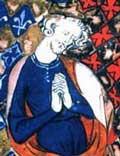 |
Henry Ib. 1068 [1] |
|
| Title: | Dei Gracia Rex Anglorum (By the Grace of God, King of the English) [2] | |
| Term: | 5 Aug 1100 - 1 Dec 1135 | |
| Chronology: | 3 Aug 1100, a meeting of magnates at Winchester chose Henry king [3] | |
| 5 Aug 1100, crowned, Westminster Abbey | ||
| 1 Dec 1135, died | ||
| Names/titles: | Count Henry (sometimes styled "comte du Cotentin") [created count between 1 Jan 1088 and 30 Mar 1088]; Dux Normannorum (Duke of the Normans) [after 28 Sep 1106]; byname: Henri Beauclerc | |
| Biography: | |
The fourth and youngest son of William the Conqueror, Henry inherited only a sum of money after the death of his father in 1087. Later Henry acquired small land possessions in Normandy and was created count by his brother Robert II "Curthose", duke of the Normans. Henry stayed at the court of his brother, King William II Rufus, when the latter was killed while hunting (2 Aug 1100). Henry immediately rode to Winchester, where the royal treasury was turned over to him. He was anointed three days later by Maurice, Bishop of London. The throne of England was also claimed by Robert of Normandy, who invaded England in July 1101, but no battle was fought. During a personal interview, Robert gave up his claim to the throne and released Henry from the homage in exchange for a large annuity and Henry's lands in Normandy. However, the misgovernment of Robert in Normandy provided Henry with a pretext to conquer the duchy. The war in Normandy broke out in 1106 and culminated in the Battle of Tinchebray (28 Sep 1106). Robert was defeated and was taken prisoner for the rest of his life (27 years). Since then Henry assumed the ducal title and spent most of his reign in Normandy. In 1107 Henry reached an agreement with the Church settling the investiture controversy, which troubled his reign from the very beginning. In the next decade the local law and institutions of Saxon England, and the royal law and central institutions of the Normans, were merged. Henry centralized the administration of England and Normandy in the royal court, using "viceroys" in Normandy and a group of advisers in England to act on his behalf when he was absent across the Channel [4]. On 25 Nov 1120 Henry's only legitimate son, William the Ætheling, perished in a shipwreck of the "White Ship". Henry faced a succession problem, but finally succeeded in persuading the barons to accept his daughter, Matilda, as heir to the throne (January 1127). In hopes of adding Angevin lands to the royal domain, Henry had Matilda married (8 Jun 1129) to to the heir of Anjou, Maine, and Touraine, Geoffroi "Plantagenêt" (future count of Anjou). In 1135 Henry scattered the forces of Norman barons instigated to revolt by his son-in-law. He died reportedly of food poisoning caused by a surfeit of lampreys according to "Historia Anglorum" of Henry of Huntingdon. |
|
| | |
| [1] | Most likely, Henry was born between mid-May and early September 1068, but there is a bare possibility that it happened in 1069. A local tradition places his birth at Selby, Yorkshire, England, but no contemporary writer confirms that belief or provides a hint as to Henry's exact birthplace. |
| [2] | Henry I introduced his charters indiscriminately as "Henricus rex Anglorum" (most frequently), but also as "Henricus rex Anglie". From 1121 Henry I altered the legend on the reverse of his seal to HENRICUS DEI GRACIA DUX NORMANNORUM, although he rarely styled himself more than "rex Anglorum" even in documents relating to Normandy. The words "dei gracia" ("by the Grace of God") appearing on the Great Seal since the time of William II, were not, as a rule, added to the style of the king in charters and writs until the reign of Henry II. |
| [3] | This meeting, described by a Saxon chronicler as a rump witan, had no authority to elect Henry, but rather conceded to making him king. Henry immediately proceeded with appointing William Giffard as Bishop of Winchester, but despite this exercise of royal authority before the coronation, Henry counted his reign from 5 Aug 1100, when he was crowned at Westminster. |
| [4] | Absent from England: autumn 1104; spring - summer 1105; Jul 1106 - Mar/Apr 1107; Jul 1108 - May/Jun 1109; Aug 1111 - Jul 1113; Sep 1114 - Jul 1115; Apr 1116 - 26 Nov 1120; 11 Jun 1123 - 11 Sep 1126; 26 Aug 1127 - 15 Jul 1129; Aug/Sep 1130 - Aug 1131; Aug 1133 to his death. |
| [5] | Handbook of British Chronology (1986) |
| [6] | "Henry I", by C. Warren Hollister (Yale Univ. Press 2001). |
| [7] | "From Domesday Book to Magna Carta 1087-1216. The Oxford History of England, vol. 3", by Austin Lane Poole (2nd ed., Oxford, Clarendon Press 1955). |
| Image: King Henry I, miniature from a 14th-century manuscript. | |
